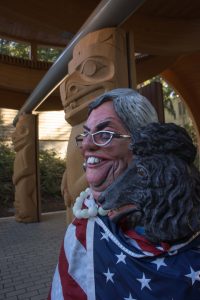
George Rammell with the remnants of Blathering On in Krisendom, which Capilano university officials confiscated and dismantled.
Elizabeth Redden, Inside Higher Ed, October 8, 2014– It took 53 days for George Rammell to get back a sculpture he’d made caricaturing his university’s president and, when officials at British Columbia’s Capilano University finally returned it to him, it was in pieces.
“They gave it back to me all smashed up,” said Rammell, a former instructor at Capilano whose sculpture was seized from the studio arts building last spring by university officials on the grounds that it constituted “harassment” of Capilano President Kris Bulcroft.
“They claim they had to destroy it in order to move it, which is absolutely ridiculous. I’ve moved it myself.”
The original sculpture, titled Blathering On in Krisendom, depicted the president and her poodle as ventriloquist dolls draped in an American flag and was conceived, as Rammell explained it, as an “anti-monument” to the president in protest of her role in carrying out program cuts. Bulcroft oversaw the elimination of several programs, including the studio arts program in which Rammell taught, in a process that was later deemed by British Columbia’s Supreme Court to be contrary to the province’s University Act in that Capilano’s Senate was not consulted.
Rammell described the original sculpture as an example of constitutionally protected caricature, but Capilano’s former board chair, Jane Shackell, directed that it be confiscated from university property because it was, she said, being “used in a manner amounting to workplace harassment of an individual employee, intended to belittle and humiliate the president.”
In order to reclaim his artwork, Rammell said, he signed an agreement that stated that he would be permitted to work on the piece in the studio arts building until his employment at the university ended on July 31. After that time, he would remove the sculpture from campus and would not bring it back. Rammell said the agreement also stipulated that he would not display any photographs of the sculpture on campus until five years after the president’s retirement. (Rammell declined to share the text of the agreement he signed but described its contents to Inside Higher Ed. Capilano officials declined to comment on the specific terms of the grievance agreement, which a university spokeswoman described as related to a personnel matter and thus confidential.)
In compensation for the damages to the sculpture, Rammell said, he received the equivalent of four days’ teaching wages.
“In retrospect I should never have signed the stupid thing; I could have finished the sculpture without getting the heap back,” said Rammell.
Finish the sculpture he has. The new sculpture, made up of pieces of the original as well as newly created components, was unveiled last week in an event at the Emily Carr University of Art and Design, in Vancouver. The piece has two faces, or fronts: a newly sculpted depiction of the president holding a mace backs up against the reassembled components of the original sculpture. Among the new elements of the sculpture, Rammell said a mace is intended to signify the trust placed in the university president, and a pen is intended to represent Bulcroft’s “unilateral” signing authority in eliminating the studio arts and other Capilano programs. The new piece is entitled Margaux and the Monarch, Margaux being the name of Bulcroft’s dog.
As for the American flag, Bulcroft previously worked at Western Washington University. Rammell said that while he has nothing against international hires, he did object to Bulcroft’s seeming disregard for a Canadian law, specifically the University Act.
“The whole piece is about academic freedom and everybody seems to be under threat,” Rammell said.
Bulcroft declined an interview through a Capilano spokeswoman, Borjana Slipicevic. A statement emailed by Slipicevic that repeatedly misspelled Rammell’s name said that “Capilano University is aware of Mr. Rammel’s current actions. The university is committed to a safe and respectful workplace for all faculty and staff; the decision to remove Mr. Rammel’s sculpture from campus was made in this vein. Capilano University and Mr. Rammel’s union negotiated a mutually acceptable settlement that resulted in giving the sculpture to Mr. Rammell; thus Capilano University considers this matter closed.”
As for the condition of the sculpture upon its return, the university’s statement said, “The effigy was dismantled to facilitate its removal; Mr. Rammel was advised that this was the case.”
Read More: Inside Higher Ed

 Follow
Follow